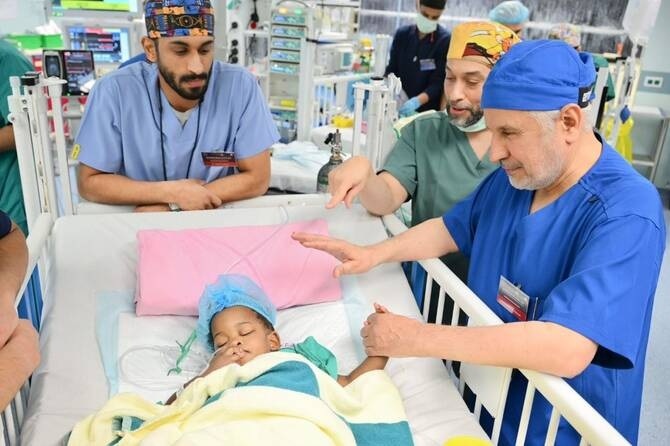Saudi doctors successfully separate Jamaican conjoined twins in complex surgery
Riyadh – A team of Saudi doctors successfully separated Jamaican conjoined twins Azaria and Azura Elson after a complex five-hour surgical operation in Riyadh.
The procedure took place at King Abdullah Specialized Children’s Hospital, which operates under the Ministry of National Guard Health Affairs. The medical achievement marks another milestone for the Saudi Conjoined Twins Program, which has gained international recognition for its humanitarian medical work.
According to the official statement, the surgery duration was reduced to five hours due to the absence of shared intestines between the twins. The medical team decided to expedite the procedure because of Azura’s critical heart condition, which required immediate and precise medical attention.
Dr. Abdullah Al-Rabeeah, who headed the surgical team, confirmed that the twins arrived in Saudi Arabia on July 28 for evaluation and treatment. Al-Rabeeah, an adviser at the royal court and head of the Kingdom’s aid agency KSrelief, said that the surgery was carefully planned after detailed medical assessments and consultations.
The twins were joined at the lower chest, abdomen, and liver, with possible sharing of intestines and the pericardium. These factors made the operation highly complex and required advanced medical coordination across several specialties.
One of the twins, Azura, had significant congenital heart defects, with her heart muscle functioning at only 20 percent capacity. This presented a major surgical challenge and heightened the risks associated with the operation.
Before the procedure, Dr. Al-Rabeeah explained the risks to the twins’ mother, who consented to the surgery after understanding the medical details and potential outcomes.
The operation was originally estimated to take about nine hours, divided into six major surgical stages. It involved a team of 25 specialized staff members, including experts in pediatric surgery, anesthesia, plastic surgery, and nursing. However, due to efficient coordination and the absence of shared intestines, the surgery was completed faster than anticipated.
Following the successful separation, both children were placed under intensive post-operative care to monitor their recovery and organ function. The medical team continues to assess their condition closely, ensuring that both twins remain stable and respond positively to treatment.
Dr. Al-Rabeeah noted that this operation was the 67th successful separation conducted by the Saudi Conjoined Twins Program since its establishment more than 35 years ago. Over this period, the program has provided medical care and surgical interventions for 152 pairs of twins from 28 countries across different regions of the world.
He emphasized that the Kingdom’s commitment to humanitarian medical work continues to strengthen global health cooperation. The program not only demonstrates Saudi Arabia’s advanced medical capabilities but also its role in offering hope and life-saving support to families in need worldwide.
The family of Azaria and Azura expressed their gratitude to King Salman and the Kingdom’s leadership for the care and hospitality provided throughout their stay. They also extended appreciation to KSrelief for facilitating the process and to the entire medical team for their skill, compassion, and dedication.
The successful surgery highlights Saudi Arabia’s growing medical expertise in complex pediatric operations and its leading position in specialized healthcare programs. It also underscores the Kingdom’s humanitarian mission to support families regardless of nationality, reinforcing its reputation as a global center for advanced medical excellence and charity-driven healthcare.
The twins are now in recovery under continuous medical supervision. The Saudi medical team remains optimistic about their rehabilitation and long-term health outcomes, marking another milestone in the Kingdom’s ongoing contributions to global humanitarian medicine.



